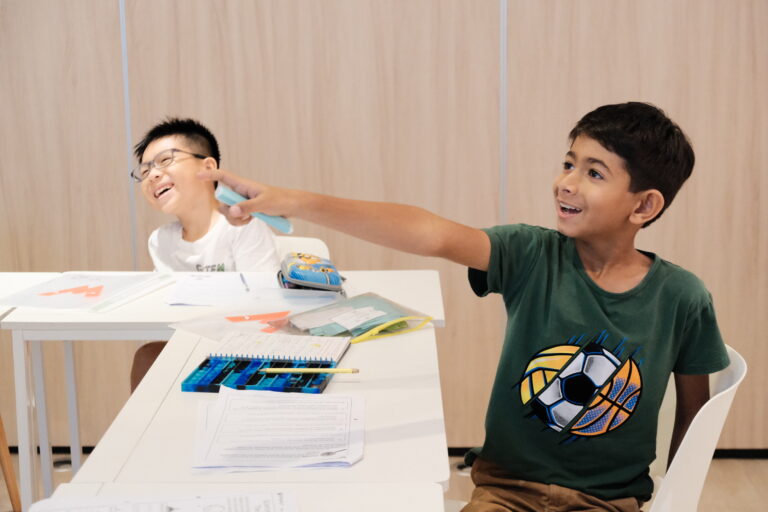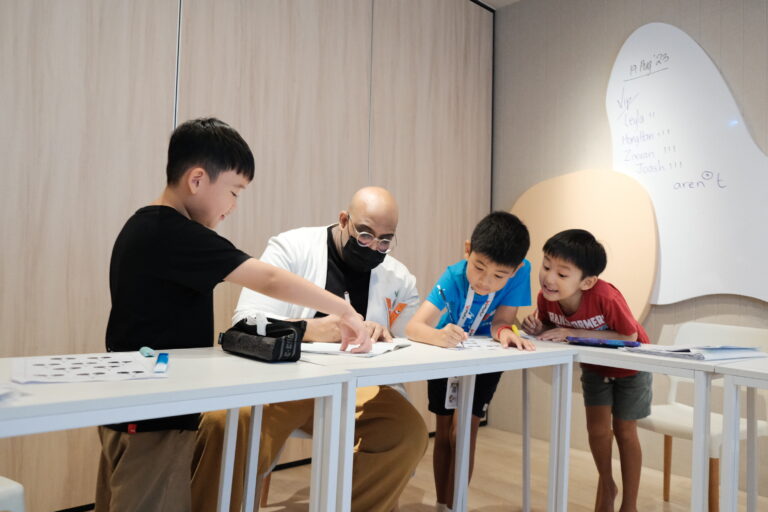
Fostering Critical Thinking
in Children

It takes a lifetime to cultivate critical thinking skills and apply them to make educated choices. As a result, fostering children’s ability to think thoughtfully and critically is crucial yet sometimes disregarded in terms of a child’s development, particularly during a child’s formative years. These skills not only enhance their decision-making abilities but also prepare them for the challenges of the future more effectively. But of course, we can’t expect young children to achieve these skills straight away, though we can plant the seeds that will prepare them for more complex thinking as they mature! Below, we explore the importance of critical thinking for children and list some valuable tips on how to raise thoughtful thinkers.
The Importance of Critical Thinking

Critical thinking is the ability to analyse, evaluate, and synthesise information to make reasoned judgements. It goes beyond memorising facts; it’s about understanding concepts, exploring diverse perspectives, and asking questions. Here are reasons why it is vital to cultivate critical thinking skills in children;
1. Lifelong Learning
Where information is readily available at your fingertips, the ability to learn (and unlearn!) is crucial. Critical thinkers are more open to new concepts and ideas, making them lifelong learners who are continuously evolving and growing.
2. Decision Making
Life is filled with choices, and making informed decisions is an important skill. By weighing the advantages and disadvantages of different possibilities, critical thinking enables children to make better decisions. Not only is this skill invaluable in the personal aspect of life, but professional too as they get older!
3. Enhanced Communication
Critical thinking serves as the cornerstone of effective communication. A child’s ability to articulate their opinions, ideas, and thoughts is improved when they learn to engage in critical thinking. In addition, kids have the capacity to be more understanding of other people’s perspectives, which is essential for having meaningful interactions.
Tips For Fostering Critical Thinking Through Thoughtful Discussion

Let’s explore below some effective strategies for nurturing this skill through meaningful conversations.
- Encourage a Love for Reading: Did you know that reading is a fantastic way to stimulate critical thinking? Encourage your child to explore various books, then discuss what they’ve read. You can also ask them to summarise and share their interpretations and opinions!
If you are researching primary reading programmes in Singapore to enrol your child in, the Wonderlit Read programme offers the perfect opportunity to advance their reading proficiency and nurture their love for reading, particularly when it comes to chapter books.
- Allow for Silence: Discussions are meant for people to converse, but there is no need to fill every moment with words. Embrace moments of silence as they provide kids with the space to think and formulate their thoughts. In fact, silence can be a powerful tool for encouraging deeper reflection!
- Create an Open and Safe Environment: It’s vital to establish an open and safe environment at home in order to nurture critical thinking. Children should feel free to voice their opinions without worrying about being judged. As you do so, encourage the building blocks of critical thinking: asking questions and invoking curiosity.
- Utilise Socratic Questioning: Socratic questioning is a method that involves asking a series of thought-provoking questions to stimulate critical thinking. These questions often begin with phrases like “Why do you believe that…?” or “What do you think about…?” This approach helps children explore their own beliefs and thoughts.
Final Thoughts
Children’s ability to think critically will be cultivated throughout their lives if critical thinking skills are encouraged in them through meaningful discussions. They can improve their decision-making, communication, problem-solving, and capacity for lifelong learning thanks to these skills. Most importantly, remember that raising critical thinkers is a continuous process. As such, your encouragement and guidance play an essential role in their growth.
Interested in giving your child an early advantage in their reading (and writing) journey? Wonderlit’s specialised literacy programme utilises a dynamic combination of hands-on activities, interactive games, and reading exercises that will pique your child’s imagination and curiosity. Besides reading and writing, we also offer a public speaking course for kids and speech and drama lessons to further nurture their communication skills. Feel free to reach out to us today to enrol your child for a complimentary assessment or to consult with our programme consultants via call or WhatsApp at 6980 5670.
Recent Posts


How To Nurture Oral Language Development in Children

Story Builders: How Reading Shapes Writing In Kids

4 Fun Ways To Nurture Children’s Love For Performing

Importance of English Phonics for Young Learners

